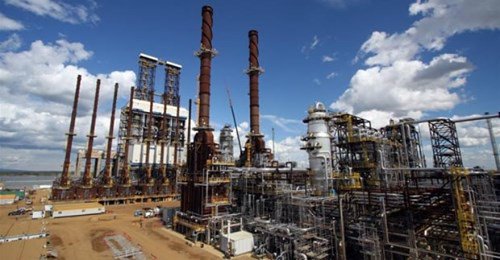Oilsands workers inside Alberta's largest COVID-19 outbreak fear for their safety

Workers at CNRL's Horizon oilsands mine in northeastern Alberta — the province's largest COVID-19 workplace outbreak — say work and living conditions are exposing them to dangerously high levels of risk.
The mine, operated by Canadian Natural Resources Ltd., is 70 kilometres north of Fort McMurray.
Since the outbreak was declared in October 2020, 1,361 people have been infected. As of Wednesday, 447 cases were active, Alberta Health Services said. Two people have died.
The outbreak is Alberta's largest in terms of active cases and total cases, Alberta Health spokesperson Tom McMillan said Wednesday.
Contractors who spoke to CBC News on condition their names not be used said they are working with inadequate physical distancing, sanitization and testing. They allege that workers who get sick are left alone in their camp rooms, without proper access to hygiene, food and medical care — and without pay.
"We don't feel safe here but we keep working because everybody wants to work," one contractor at Horizon said.
"We don't make enough money sitting at home with [employment insurance]."
CNRL is also contending with outbreaks at its Jackfish and Albian sites. In a statement Wednesday, the company said it is working with AHS to contain the spread of the coronavirus at its sites.
Unsanitized washrooms, crowded lunchrooms
The Horizon worker said he has to share an unsanitized washroom with more than 50 others on his camp floor.
Workers are shuttled on cramped buses and eat together in crowded lunchrooms, he said.
The worker said he has not been infected, but believes he has been exposed to the virus numerous times.
"In the washrooms, we don't even have hand sanitizer," he said. "I am sharing my washroom and shower with someone who has COVID every week … I have been in a lunchroom with 36 people and 34 of them had tested positive for COVID."
In a statement to CBC News, CNRL said its "stringent" outbreak protocols meet or exceed those established by AHS.
The company said its response includes using rapid-testing kits and partnering with AHS to organize targeted vaccination clinics for workers.
CNRL said it is using daily health checks, screening prior to boarding company transportation and physical distancing measures in camp. Medical staff are on site to complete health assessments and rapid testing of symptomatic workers and their close contacts, it said.
"During our recent Horizon maintenance period, we also used rapid testing of asymptomatic staff to help us quickly identify, contact trace and limit the spread," the company said.
Quarantine camps
Hundreds of oilsands workers have quarantined at work camps during the pandemic. With the third wave, entire floors of worker housing are operating as quarantine zones.
The Horizon contractor said that as cases began to surge last month, quarantine camps at the site became so full that infected workers had to be shuttled to nearby hotels.
"It's crazy," he said. "You could be travelling with anyone who has COVID because they are only testing once a week … it's not enough."
As of Wednesday, outbreaks had been declared at 19 oilsands sites and work camps in the Wood Buffalo region.
The regional municipality, grappling with some of Alberta's highest COVID rates, declared a state of local emergency in April. It remains in effect.
Dr. Deena Hinshaw, Alberta's chief medical officer of health, said AHS is in "constant contact'' with oilsands operators to ensure outbreak protocols are in place and that rotational workers are immunized quickly
Variants have driven Alberta's third wave and the oilsands are no exception, Hinshaw said Tuesday.
AHS said it last inspected CNRL Horizon on March 16 and found some areas of concern, including the need for more signage around hand hygiene and more access to hand sanitizer.
It also said further controls to encourage physical distancing and sanitization within the cabins of heavy equipment and work trailers were needed.
'Head down, blinders on'
Cases at Horizon started to surge in April during turnaround season, when hundreds of maintenance contractors were flown in from across the country, said a second CNRL worker who spoke with CBC News.
The woman, who works at Albian, said she uses mining equipment that goes unsanitized. She said she shares a washroom with two roommates who continue to work despite persistent coughs.
The woman said many workers are flouting the rules and that restrictions around masking and physical distancing are not being enforced. A lack of pay for contractors on isolation time has some ignoring their symptoms, she said.
"I've heard them even say, 'I feel like shit, but I've got to go because I can't miss that day's pay,'" the woman said.
Contractors are afraid to confront management for fear of losing their jobs, she said.
"We're all feeling like, head down, blinders on. Don't even look around you and just try to get through your shift without getting sick.CBC







